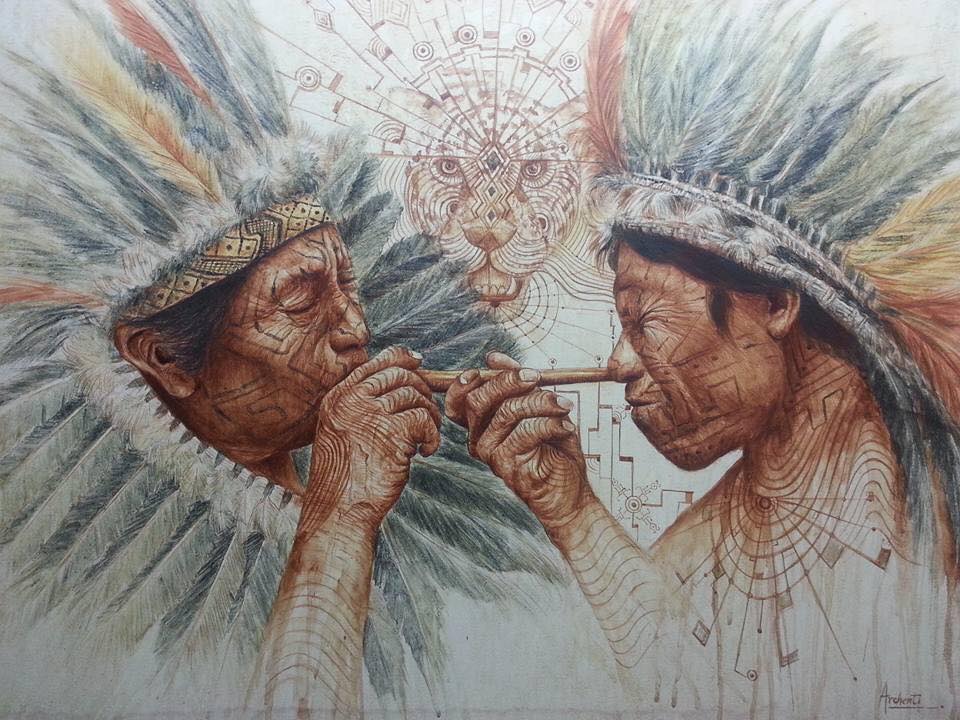Apply now for this year’s annual Healing and Self-Expression Retreat in the Sacred Valley and Machu Picchu, Peru
What are the links between intoxication and insight?
At a recent presentation on creativity, innovation, and entrepreneurship at San Francisco State, a shy student in the audience wrote a note to the professor, Andy Lambert, who then asked me this:
How to bring the feeling of uninhibited creativity that often accompany intoxication into everyday life?
Human beings have a natural desire for intoxication.
In his book Intoxication: The Universal Drive for Mind-Altering Substances, psychopharmacologist Ronald K. Siegel as the fourth human drive behind thirst, hunger, and sex.
The question is why? and what role does intoxication play in creativity. Here’s what I wrote in an article, “In Defense of Intoxication: How Our Natural Desire for Altered States Fuels the Creative Process”
It is my belief that intoxication is the biological drive that enhances the plasticity of the brain itself. By its very nature, intoxication kicks us out of our ability to conduct business as usual, leaving us impaired to certain things, but opening us up to fresh ways of seeing the world.
Indeed, conscious self-awareness may have been a sort of mind mutation resulting from early primates being driven out of their trees by climate change and mistakenly ingesting strongly psychoactive substance while foraging in the forest floor.
At its worst, our desire for intoxication, our submitting to intoxication, and our subsequent guilt or regret creates individuals with, Dr. Jekyll, Mr. Hyde-type personalities, one part that is blandly conformist, the other that is monstrous and out of control.
We see this type of person all around, even in ourselves, first indulging our natural desires for intoxication, then berating ourselves for being impaired and temporarily unproductive.
On the other hand, if we embrace intoxication as a natural part of our body-mind makeup, we can utilize those miraculous states as catalysts for our own growth, creativity, and full-person integration.
In this way, we don’t look at intoxication as simply “checking out”, “taking a load off”, or “blowing off steam”. We celebrate it for what it is: our very intelligent body, our unceasing heart, and our powerful, yet habit-prone minds asking us to take a breather from our own, tired, world view.
Between the extremes of hollowed-eye vagrants destroying themselves for their next desperate fix and white knuckled puritans hiding behind walls of good and evil, there is a vast space for curious, intelligent, and conscientious humans to explore. Only some of the territory can be viewed, for lack of a better word, sober.

Intoxication has a long history. Here, for example, is a artist’s rendering of an Amazonian rapé ceremony (pronounced ha-PAY). The shaman blows rapé – powdered medicinal herbs often with a tobacco base – into the nose of a participant, an experience that can bring forth feelings of intoxication, sometimes unpleasant, but also afford profound experiential insights.
When does intoxication become addiction?
When does intoxication become an addiction? When we become addicted when we become attached to the state afforded by the intoxicating experience over the insights the arise from those experience.
When we become addicted to anything, we stop relating with the world creatively, and instead related to it habitually, having knee-jerk reactions and making impulsive decisions. In other words, we cease engaging in any real co-creation with the world around us.
Based on the dangers of addiction, some people choose to forgo intoxication entirely. This, however, is also limiting.
To forgo intoxication entirely is to miss out on our full potential as human beings.
Again, from my article, “In Defense of Intoxication”
We are not human because we are instinctual. We are not human because we are omnipotent. We are human because we are able to experience the world in novel ways—a world that is sometimes stable, a world that sometimes heaves and buckles—and adapt accordingly. By submitting to those experiences and through our willingness to learn from them, we allow them to change our orientation, push us forth in new, enlivening directions, and to guide us deeper and deeper into the awesome mystery that surrounds us.
In this light, intoxication, when seen for what it really is, can be a wise teacher and a valued friend during our life-long creative journey.
About the author
Austin Hill Shaw is a creativity expert who works with individuals who want to unlock their full creative potential and organizations that want to build cultures of innovation. He is the founder of Creativity Matters, author of The Shoreline of Wonder: On Being Creative, and inventor of The Creativity Quiz.
Apply now for this year’s annual Healing and Self-Expression Retreat in the Sacred Valley and Machu Picchu, Peru
Click here connect with Austin to bring more creativity and innovation into your organization.
What type of creator are you? Take the Creativity Quiz and find out!